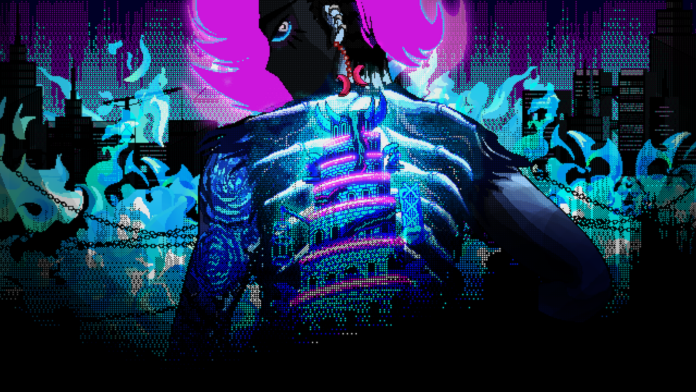If there ever was a fitting metaphor for the trials and tribulations that indie developers face while creating their debut game, it’s Ascending Inferno, the upcoming release by Australian developer Oppolyon Studio. In this unforgiving experience, players must guide Dani through the nine layers of hell, to save the soul of her younger brother Vincent, who has been reduced to the form of a football. Every wrong kick, mistimed jump, or miscalculation sends Vincent plummeting back to the depths, forcing players to start over from scratch. It’s a brutal journey of persistence, frustration, and constant restarts, where the stakes are as emotional as they are mechanical.
For Oppolyon Studio’s co-founder, Isaac Iozzi, this hellish struggle is all too familiar. As first-time indie developers, their journey mirrors the very game they’ve crafted. Every setback in development, every challenge, and every burnout-inducing all-nighter echoes the relentless drive Dani must summon to save her brother. “Combining our other jobs and working on the game at the weekends and late at night is innately hard to do,” he says. “Because of that, burnout tends to sneak up on us.”
“We were really inspired by watching streamers like Ludwig tackle games like Jump King and Getting Over It,” says Isaac Iozzi, acting as director and game designer on Ascending Inferno. “Seeing their struggles, frustrations, and eventual triumphs sparked something in us. We thought, ‘Wouldn’t it be cool to see them, and others, play through our version of hell?’ That thought helped shape what would become Ascending Inferno.” This spectator-friendly appeal of Foddian games provided the foundation for Oppolyon’s vision, blending the masochistic joy of constant resets with a compelling emotional undercurrent, Dani’s desperate mission to save her brother.
Internal debate
The development of Ascending Inferno wasn’t just about embracing punishing mechanics though. It was also about injecting creativity into the classic depiction of hell. Each layer of the game corresponds to a different circle of Dante’s Inferno, bringing unique gameplay mechanics to the table. “Each layer of Inferno has its own twist, affecting either Dani or Vincent in some way,” explains Iozzi. “For example, in Gluttony, there are ‘Hot Plates’ that send Vincent bouncing around uncontrollably. It’s chaotic, and it’s on Dani to save him before he falls. These unique mechanics didn’t always exist, as there was quite a lot of internal debate around how unique we should make them or if we wanted to stick to more ‘traditional’ platforming mechanics and reuse them throughout the game as a whole.”

Oppolyon Studio’s journey began in 2016 as a dream shared by Iozzi and his partner Rebecca Haller-Trost, but like many indie studios, life got in the way. “We actually came up with the name ‘Oppolyon’ in 2016, but we had to shelve it while we focused on studies and other responsibilities,” Iozzi recalls. “It wasn’t until 2022, nearing the end of our studies, that we decided to revive that dream. We reached out to our two best friends, Ben and Bas Anderson, and together we officially started the studio.” The Canberra-based team is now four members strong, with additional help from freelancers.

Limbo and Lust
Visually, Ascending Inferno went through several transformations during development. Initially conceived as a flat 2D platformer, the game evolved over time into a richly detailed 2.5D experience. “The art style was originally simpler, but we decided to push the depth further after one of our artists, Ricky, pitched the current look of the game,” says Iozzi. “He was inspired by the depth in Ori and the Blind Forest. We loved the idea, but it did mean we had to redesign and remake significant parts of the game, including Limbo and Lust, which cost us about four months of progress.” Despite the setback, the team believes that the added visual complexity was well worth the time.

Balancing their vision with the realities of indie development has been a constant challenge for Oppolyon Studio, particularly when it comes to managing burnout. “Burnout has been one of the toughest parts of the process,” Iozzi admits. “We’re all juggling other jobs and responsibilities, so we’re working late nights and weekends on the game. It doesn’t feel like work because we love what we do, but the exhaustion creeps up on you.” This balance between passion and practicality is a common struggle for indie developers, but it’s one that the team at Oppolyon is still navigating as they push towards the game’s release.
Huge moment
Financing an indie project is another significant hurdle, and for the team the journey was initially a scrappy one. “At the start, the four of us were putting aside money from our full-time jobs to fund the studio,” says Iozzi. However, the tide turned in 2024 when they secured a government grant from Screen Australia. “Receiving that funding was a huge moment for us. It allowed us to take time off work and dedicate more energy to the game. We could actually support ourselves while pushing the game forward.” This financial relief has been essential not only for completing the game but also for helping the studio expand its visibility through marketing efforts and events like PAX Australia.

As Oppolyon Studio nears the release of Ascending Inferno, the team is already reflecting on the lessons learned throughout the development process. “There are way too many lessons to name just one,” Iozzi says with a laugh. “This is our first title, and for a lot of us, it’s our first commercial game. But now that we’ve been through the entire development pipeline, we feel like we’ll be able to hit the ground running for project two.”
Ascending Inferno is out on 28 October.

